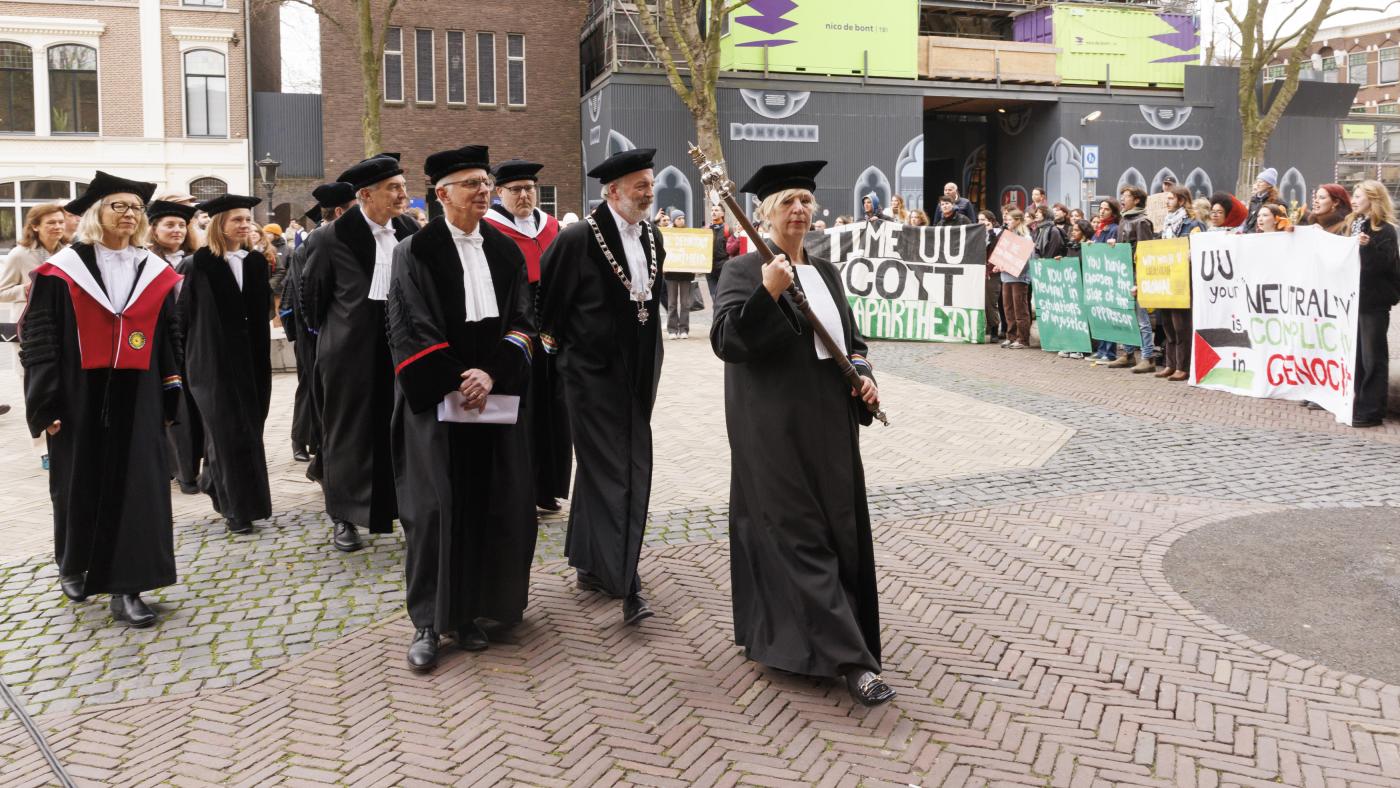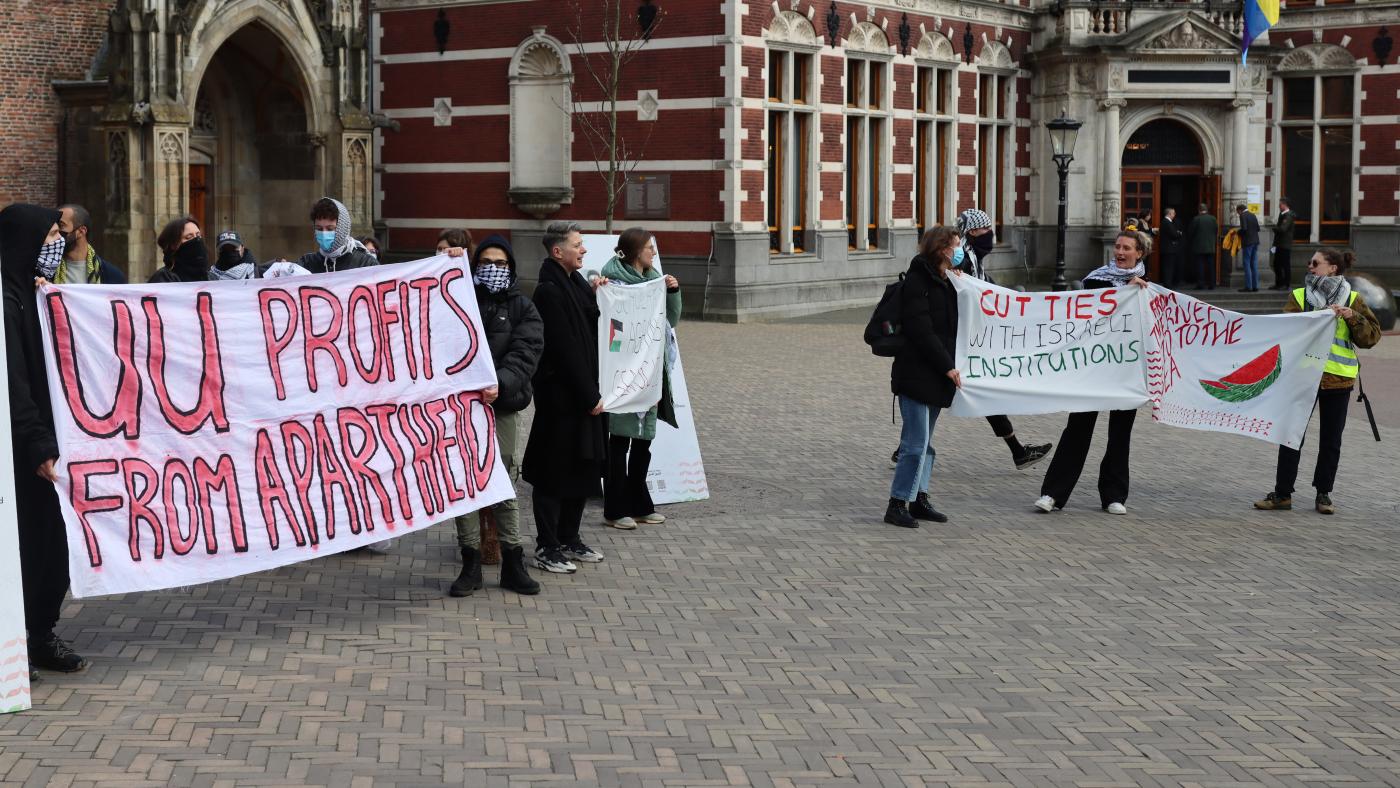Letter and petition
Professors express dissatisfaction with UU's Israel policy

There has long been a debate among professors about what position Utrecht University should take when it comes to Gaza. Three of them have now taken the initiative to write a letter to the Executive Board asking for a firmer position. The letter had been signed by 64 professors already by Monday 26 May.
"We feel that the university is doing far too little to speak out emphatically against violence and would like to see a strong statement on cooperation with Israeli organisations," says Sanne Akkerman, professor of Teaching & Learning Sciences and one of the initiators. "Because the Executive Board had announced tightened policies, we waited to send the letter. But the new statement, which was announced on Friday 16 May, leaves existing collaborative projects untouched. We do not think this is appropriate given the terrible situation in Gaza that we all witness daily. That is why we sent the letter to the board on Saturday."
Moral boundaries
The letter calls for explicit limits on academic cooperation in situations of genocide. "End cooperating with Israeli institutions that do not speak out against the violence and crimes against humanity now being committed on a large scale in Gaza."
According to Maarten Hajer, professor of Urban Futures & Futuring, "this is a situation where we have to set moral boundaries. Remember, the moral integrity of our own institution is also at stake here."
Professors say universities are not neutral bastions of knowledge. And when fundamental values are at stake, universities must speak out and act accordingly. According to the professors, this fits with previous statements by UU, including when it stated in 2023 that it would not enter into cooperation with the fossil industry and also the decision to stop cooperation with Russia because of the war in Ukraine, although this was instigated by the government.
The letter says: "It is high time to extend this line of reasoning to collaborations with Israeli institutions that refuse to speak out in favor of the fundamental human rights to life, liberty, and security. International organisations such as the International Court of Justice, human rights experts and Israeli whistleblowers have been reporting mass violence against civilians and aid workers, displacement, destruction, and now targeted starvation."

Call to sever ties with Israeli organisations during the Dies 2025. Photo DUB
Clear signal
The letter and petition run parallel to an initiative by UU employees also calling for tighter policies, but which is also a protest against police brutality during the eviction of Drift 13 last week.
"I think it complements each other. We started our petition because, as professors, we wanted to send a clear signal," says Jaap Denissen, professor of Developmental Psychology. "The professors involved come from different faculties."
There was some discussion about the way the initial letter was distributed. For instance, DUB spoke to professors who did not like the fact that a head of department or a board officer sent the letter asking them to sign.
"That was a dilemma, because many professors are indeed also aa board officer," Denissen says. "It was certainly not our intention to put relationships within the organisation on edge and certainly not to impose on people to sign. All professors signed and distributed the original letter in their personal capacity."
Swift action
"Voicing shared concern is essential because action needs to be taken as soon as possible," Akkerman adds. "At UU, steps have been taken, but it is too little and it is far too slow. Why don't universities collectively speak out strongly against this terrible violence? Why don't we actively seek out Israeli partners who do speak out against the policies of their government? Why are we as academia not letting our own government know that we do not accept genocidal violence and that we think they should speak out more forcefully?"
The professors' letter is not just about Gaza. Akkerman: "We believe that as a university we should not cooperate with partners in areas where human rights violations are widespread." Or as worded in the letter: "This is not a boycott based on nationality or ethnicity. "
Other concrete actions that the group envisions as a result of the letter and petition are organising dialogues at the university on its role in conflicts. Another concrete action would be the establishment of a fund to support Palestinian researchers.
The Executive Board has already expressed its intention to enter into talks with the professors. Akkerman: "That is positive. But I would call for action, because every day counts. In a university, we often engage in extensive consultations first, but this situation is so dire that swift and clear action is needed."